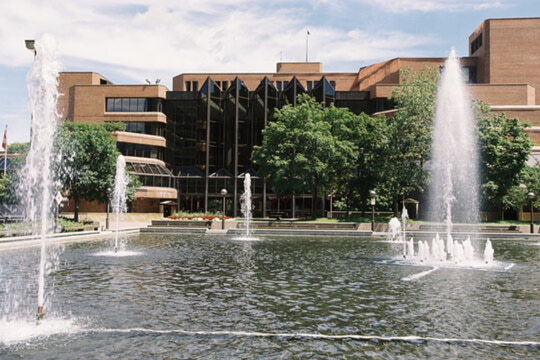Quebec Civil Society Groups call for suspension of Bill 69 after Minister's resignation
Tashi Farmilo
On September 4, civil society groups in Quebec called for the suspension of parliamentary discussions on Bill 69 following the resignation of Economy, Innovation, and Energy Minister Pierre Fitzgibbon. The bill, initially introduced on June 6, seeks to overhaul the regulatory framework for energy production and distribution in the province, with significant implications for both the public and private sectors. As discussions were set to begin on September 10, the groups argue that the government should seize the moment to rethink the legislation, particularly in light of the profound changes it proposes for the energy landscape.
Bill 69, if passed, would alter seven regulations, amend 15 laws, and introduce a new legislative framework that civil society organizations argue would have far-reaching consequences. Chief among the concerns is the shift toward a model that would allow private producers to sell electricity directly to consumers, bypassing Hydro-Québec, the public utility long seen as a pillar of Quebec’s energy sovereignty. This change, inspired by the liberalized electricity market of Alberta, would open the door for private investment in renewable energy projects, but critics argue that it risks undermining the collective management of the province's energy resources.
Currently, Hydro-Québec holds a monopoly on electricity distribution, purchasing surplus energy from private producers, who account for 17% of Quebec’s electricity production. Under the new bill, private companies would be permitted to sell electricity directly to adjacent consumers, a move that has sparked concerns about the gradual privatization of the province’s energy system. This shift is being framed by the Coalition Avenir Québec (CAQ) government as a way to attract private capital to expand renewable energy infrastructure without relying heavily on public funds. By encouraging private investment, the government hopes to increase energy capacity to meet the needs of growing industrial projects without dipping into public coffers.
Critics, however, contend that this model prioritizes profit over public interest, with civil society groups warning that the bill could drive up electricity prices, exacerbate environmental injustice, and deepen social inequalities. The CAQ’s reliance on private capital for energy investments, they argue, mirrors the controversial health-care reforms inspired by Alberta’s privatization model. Furthermore, while Hydro-Québec is a global leader in hydroelectricity, the company’s ability to reinvest in infrastructure is constrained by its obligation to remit 75% of its profits to the government, up from 50% before 2008. This limits its financial flexibility, which the government hopes to offset by leveraging private capital to finance its ambitious $180 billion investment plan through 2035.
The civil society groups opposing Bill 69 have urged that the energy transition—essential in the fight against climate change—must be guided by ecological and public good considerations rather than private profit. They argue that leaving energy production to private companies undermines the collective planning necessary for a successful transition to sustainable energy. The bill’s promotion of private wind farms, for instance, is criticized as shortsighted, potentially leading to overconsumption and a failure to reduce overall energy demand, a key component of ecological sustainability.
Furthermore, the groups point out that the bill does little to address the phase-out of fossil fuels, which still account for 50% of Quebec’s energy consumption. Instead, they argue, it risks further entrenching the profit-driven approach that has led to the global ecological crisis in the first place. They stress the need for a public energy policy that reduces energy consumption and prioritizes ecological integrity over economic development.
Ultimately, the civil society organizations are calling for a full withdrawal of Bill 69, insisting that the government first hold a broad democratic debate about the province’s energy future. They argue that the legislation, crafted behind closed doors without public input, represents a stark departure from the foundational principles of Hydro-Québec’s nationalization in the 1960s, which had been the subject of public debate and a referendum. They propose a new energy management plan developed in consultation with the public, ensuring that any future legislation aligns with Quebec’s ecological and social goals. Until such a process is undertaken, they argue, any bill on energy reform lacks legitimacy and risks jeopardizing Quebec’s energy sovereignty and environmental future.
The signatories of the call to action include prominent environmental organizations such as Greenpeace Canada, Équiterre, and the David Suzuki Foundation, as well as labour unions and health associations. Together, they represent a broad coalition advocating for a more democratic, sustainable, and publicly controlled energy policy for Quebec.
Photo: Civil society groups in Quebec are urging the government to suspend Bill 69, which would allow greater private involvement in electricity production, following the resignation of Energy Minister Pierre Fitzgibbon, calling for a more democratic and ecologically focused energy policy. (TF) Photo screenshot of press conference on CPAC





